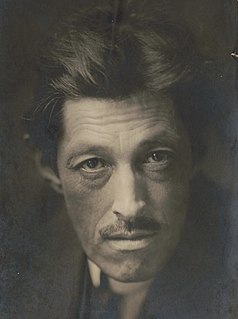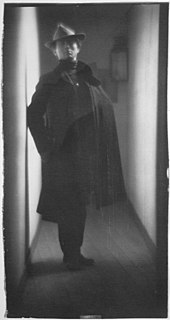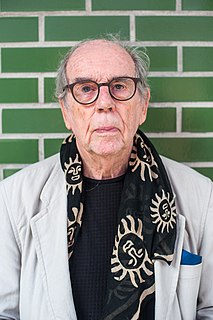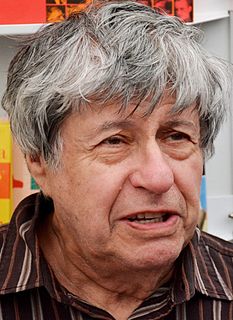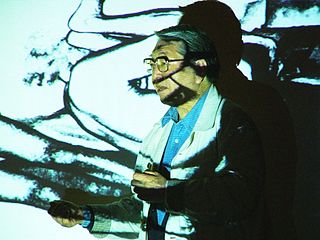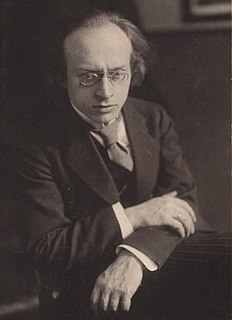A Quote by Sadakichi Hartmann
There is no art which affords less opportunity to execute expression than photography. Everything is concentrated in a few seconds, when after perhaps an hours seeking, waiting, and hesitation, the photographer sees the realization of his inward vision, and in that moment he has one advantage over most arts - his medium is swift enough to record his momentary inspiration.
Related Quotes
The photographer's problem is to see clearly the limitations and at the same time the potential qualities of his medium, for it is precisely here that honesty no less than intensity of vision is the pre-requisite of a living expression. The fullest realization of this is accomplished without tricks of process or manipulation, through the use of straight photographic methods.
Photography is a medium of formidable contradictions. It is both ridiculously easy and almost impossibly difficult. It is easy because its technical rudiments can readily be mastered by anyonwith a few simple instructions. It is difficult because, while while the artist working in any other medium begins with a blank surface and gradually brings his conception into being, the photographer is the only imagemaker who begins with the picture completed. His emotions, his knowledge, and his native talent are brought into focus and fixed beyond recall the moment the shutter of his camera has closed.
Photography is unlike any other art form. In the other arts there is always a continuous interplay between the artist and his art. He has the painting or sculpture before him. What we have tried to do is to provide a medium for "artistic expression" to anyone with only a reasonable amount of time. By giving him a camera system with which he need only control his selection of focus, composition and lighting, we free him to select the moment and to criticize immediately what he has done. We enable him to see what else he wants to do on the basis of what he has just learned.
Art is expression; what is expressed is often the vision of a subtle and powerful soul, and also his experience with his vision; and however vivid and skilful he may be in the means of expression, yet it is frequently found that the master-spell in his work is something felt to be indefinable and inexpressible.
The master in the art of living makes little distinction between his work and his play, his labor and his leisure, his mind and his body, his information and his recreation, his love and his religion. He hardly knows which is which. He simply pursues his vision of excellence at whatever he does, leaving others to decide whether he is working or playing. To him he's always doing both.
When one has praised Turgenev, however, for the beauty of his character and the beautiful truth of his art, one remembers that he, too, was human and therefore less than perfect. His chief failing was, perhaps, that of all the great artists, he was the most lacking in exuberance. That is why he began to be scorned in a world which rated exuberance higher than beauty or love or pity.
Painting is the most beautiful of all arts. In it, all sensations are condensed, at its aspect everyone may create romance at the will of his imagination, and at a glance have his soul invaded by the most profound memories, no efforts of memory, everything summed up in one moment. Complete art which sums up all the others and completes them.
One view of photography is that it is a zen-like act which captures reality with its pants down - so that the vital click shows the anatomy bare. In this, the photographer is invisible but essential. A computer releasing the shutter would always miss the special moment that the human sensibility can register. For this work, the photographer's instinct is his aid, his personality a hindrance.
Every few seconds a new book sees the light of day. Most of them will just be a part of the hum that makes us hard of hearing. Even the book is becoming an instrument of forgetting. A truly literary work comes into being as its creator's cry of protest against the forgetting that looms over him, over his predecessors and his contemporaries alike, and over his time, and the language he speaks. A literary work is something that defies death.
The philosopher is like a man fasting in the midst of universal intoxication. He alone perceives the illusion of which all creatures are the willing playthings; he is less duped than his neighbor by his own nature. He judges more sanely, he sees things as they are. It is in this that his liberty consists - in the ability to see clearly and soberly, in the power of mental record.
I think that the photographer must completely control his picture and bring to it all his personality, and in this area most photographs never transcend being just snapshots. When a great photographer does infuse the snapshot with his personality and vision, it can be transformed into something truly moving and beautiful.
